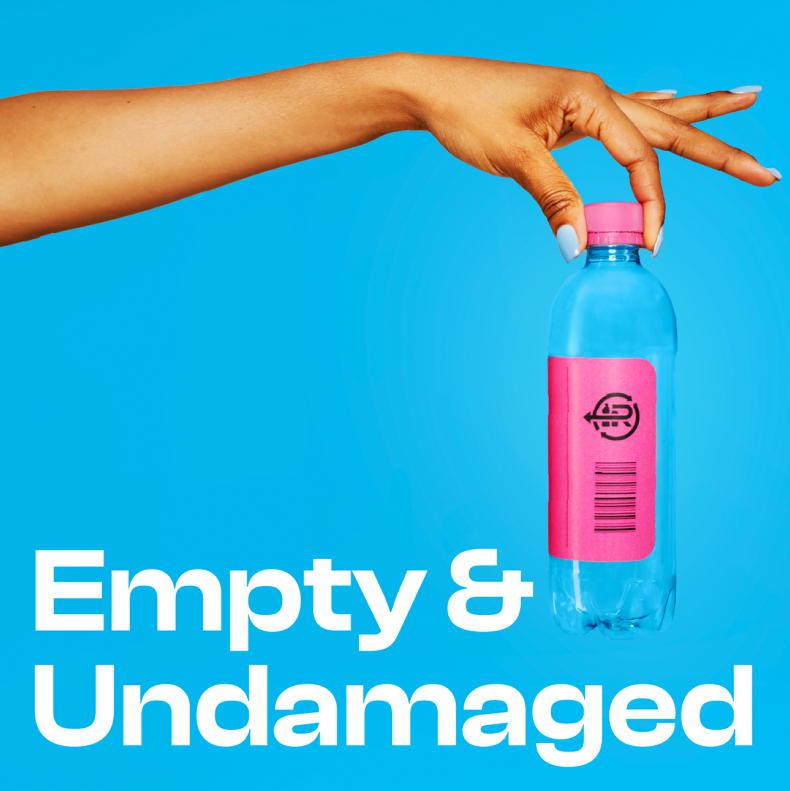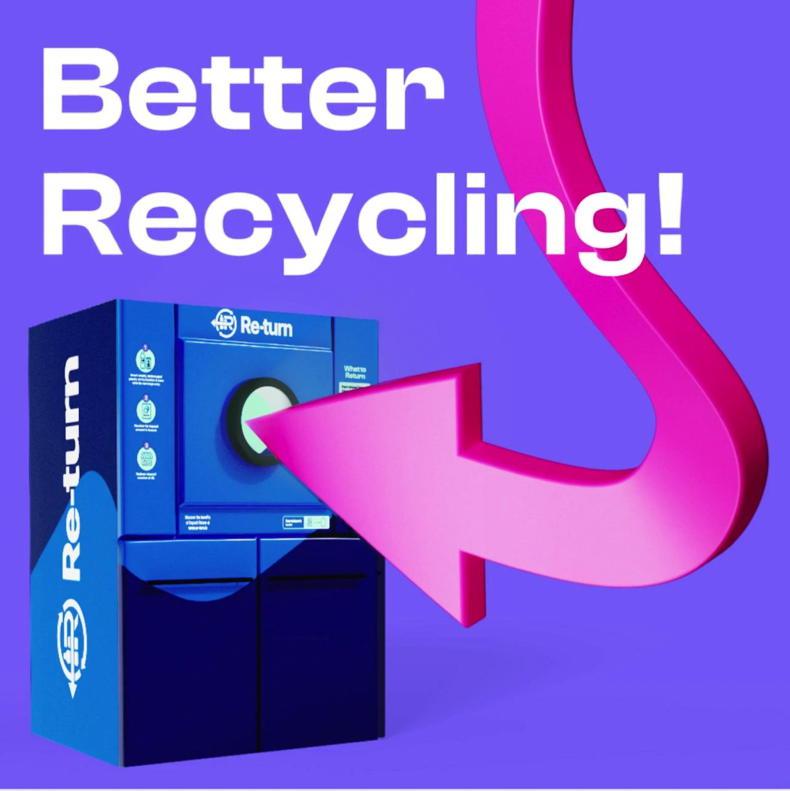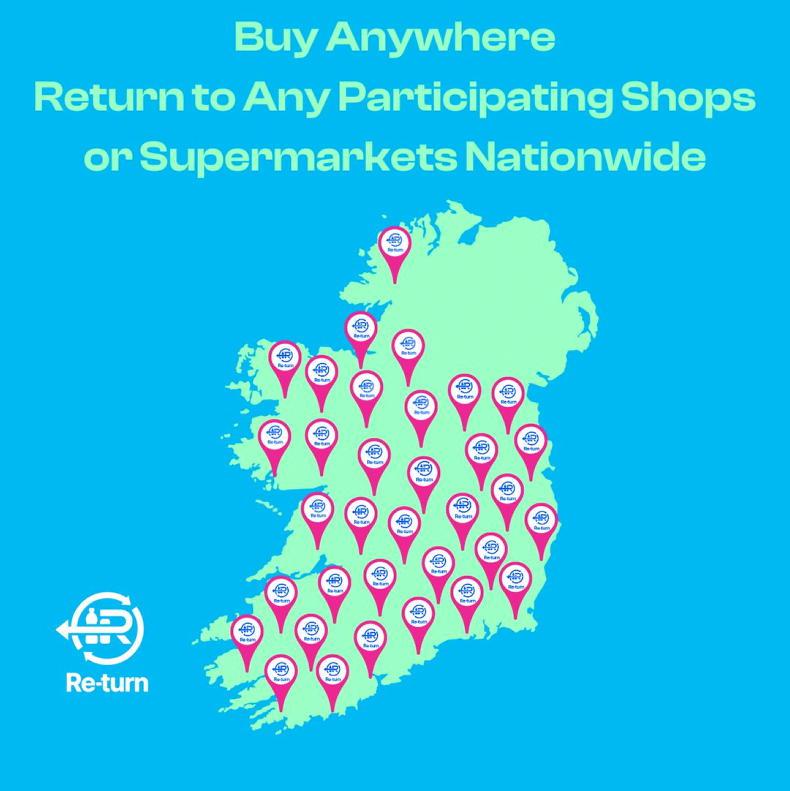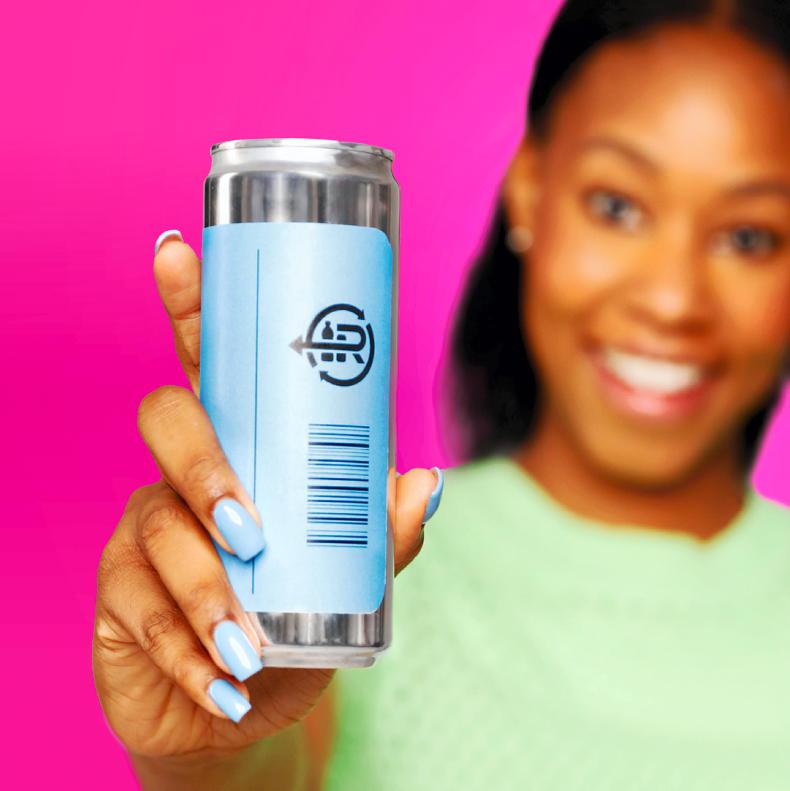I can see your eyes rolling into the back of your head as you read this. With all of the increased costs we have experienced in Ireland over the past few years, is the Government really going to start charging us for recyclable drinks containers? The reality is – yes, they are.
When?
Here is everything you need to know ahead of the launch of the new Deposit Return Scheme (DRS), which will happen on 1 February 2024.
What?
Once the scheme is launched, a deposit of either 15c or 25c (depending on the volume) will be taken on the following drinks containers:
PET plastic bottlesAluminium cansSteel cansThe deposit will apply to all of the above which are between 150ml and 3L in volume. It will be taken at the time of purchase and per container (so each container in a multipack for example, will incur a separate deposit fee).
Anything over 500ml in volume will cost an additional 25c at the time of purchase – everything below will be 15c. Containers larger than 3L or smaller than 150ml will not incur a charge.
While you will be charged this deposit at the time of purchase, you will also have the opportunity to get the entire deposit repaid. Regardless of where you are living in Ireland, there should be multiple locations which will both accept your returns and repay your deposit fees.
Why?
The DRS has been in development for several years and mirrors similar initiatives found throughout the world. The first country in Europe to initiate such a scheme was Sweden in 1984. Since then, a further 13 European countries have implemented similar schemes which have been successful, with generally high levels of return rates being recorded.
The EU has set Ireland a target to separate and collect 77% of plastic beverage bottles by 2025. This target will rise to 90% in 2029. Currently in Ireland, only 60% of PET bottles and cans are being recycled. By implementing the DRS, the Government hopes to solve the issue of the remaining 30%. Glass bottles are not being included in the DRS because their recycling rates are already well over 80% and surpassing targets.

To get your deposit back, containers need to be empty and the barcode needs to be visible.
Who?
In November 2022, Minister of State with responsibility for Communications and Circular Economy, Ossian Smyth, officially launched the scheme. At the time, he said it would, “transform the way we think about empty drinks bottles and cans.”
The Government appointed a not-for-profit organisation, Re-turn, to operate and roll out the scheme. Their logo will be visible on each container.
In correspondence with Irish Country Living, a spokesperson for the Department of the Environment, Climate and Communications (which is the Department responsible for the scheme roll-out) laid out some additional facts:
“Deposit return schemes are operating effectively in over 40 countries around the world, including 14 in Europe. Currently, the average return rate for DRS schemes across Europe is 92%, with the more established schemes achieving rates of up to 98%. Our EU target under the Single Use Plastics Directive is 90% by 2029, with an interim target of 77% by 2025. We fully expect to achieve or exceed those targets. As an example, Malta, which launched its DRS in November 2022, achieved a 79% return rate in its first year.”
Benefitting rural Ireland
Speaking with Irish Country Living, Minister Smyth says he feels confident that the DRS will be successful in Ireland and will benefit the whole country – especially rural regions.
“I think with these new schemes, which encourage a lifestyle change, there’s always a bit of scepticism [at first],” he says. “But what we’ve seen in the past – the indoor smoking ban, for example, or the plastic bag levy – is that take-up is consistently better than expected.
“What that translates into, for rural Ireland, is you’ll be walking along your hedgerows and roads and currently they are littered with cans and bottles from people throwing them out of their vehicles.
“Sure, there will still be people littering [after the launch] but there will also be people picking them up and bringing them back for money, so ultimately, we are looking toward a cleaner countryside.”
For those living rurally with a bi-weekly waste collection, Minister Smyth says we can look forward to bins which are less full; potentially keeping a bit more money in our pockets.
“If you put these recyclables in your bin, they’ll still be taken away but obviously you will not be seeing a deposit return on them,” he says. “Ultimately, there will be less plastic and aluminium in your green bin, so you’ll be filling up your bin more slowly. In supermarkets, we expect to [eventually] see fewer multipacks on offer. Someone recently said they couldn’t drink their local tap water and had to buy it in. However, large containers of water — anything over 3L – will not attract a charge.”
How?
Reverse vending machines (RVMs) will be introduced to all major supermarkets and most shops around the country. Some shops will opt out of having a vending machine on-site and will instead manually operate the returns.
On all of the items you can get a deposit back from, there will be a Re-turn logo (see image). You place the recyclables into the vending machine and the machine will read their barcode. Once they are all returned, you will receive a voucher with the amount owed to you. Bring this voucher to the counter of the shop and you will be reimbursed.
You don’t need to have purchased the recyclables in the shop where you are returning them, but once you have your voucher you can only reclaim your deposit in that shop.
To regain your deposit money, be aware:
•Damaged containers will not be accepted. You don’t need to wash them in hot water, but you shouldn’t crush your cans, for example. They need to be empty and the barcode visible.
•Only return bottles and cans which have the Re-turn symbol on them. There will be a few weeks after 1 February where shops will still be selling older stock without the logo – you will not be able to get a deposit back on these because you will not be charged a deposit.
•Containers will be accepted with or without their lids.

Reverse vending machines (RVMs) will be introduced to all major supermarkets and most shops around the country.
Where?
Multiple collection points will be located around the country. After 1 February, you can visit re-turn.ie for a detailed map of all the collection points closest to you. The map currently on the Re-turn website is for illustrative purposes only and will be updated once the interactive map is available.
Exemptions
Every retailer selling the recyclable containers included in the DRS – big or small – needs to register under the scheme and by now, the majority will be. However, some smaller shops have applied for an exemption to the scheme. The spokesperson from the Department of the Environment, Climate and Communications confirms that exemptions are taking place.
“Under the DRS regulations, retailers are obliged to provide a take-back service for consumers,” they write. “While there are exemptions available for some retailers (e.g. those operating from very small premises, vending machines and online sales), there will be return points all across the country.”
Minister Smyth expands on this: “Anyone who sells in-scope containers has to register under the DRS, but you can get an exemption. This is for small shops under 250 square metres in size.”
He adds that you can also apply for the exemption if you are operating within the hospitality sector or in online sales.
This has come as a relief to many rural shop owners as the maintenance costs and cost of incorporating an RVM would put many in a difficult financial situation, even with available loans and after being paid a handling fee for each recycled container.
One shopkeeper told Irish Country Living that once you registered, you then apply for the exemption, but the process was complicated and required several phone calls to the Department for clarification.
Once granted, the shop receives a certificate stating their exemption which will be on display.

An interactive map will be launched on the Re-turn website on 1 February highlighting all collection locations.
Read more
Eating like a European
Farm to glass: Waterford's Curraghmore Whiskey
I can see your eyes rolling into the back of your head as you read this. With all of the increased costs we have experienced in Ireland over the past few years, is the Government really going to start charging us for recyclable drinks containers? The reality is – yes, they are.
When?
Here is everything you need to know ahead of the launch of the new Deposit Return Scheme (DRS), which will happen on 1 February 2024.
What?
Once the scheme is launched, a deposit of either 15c or 25c (depending on the volume) will be taken on the following drinks containers:
PET plastic bottlesAluminium cansSteel cansThe deposit will apply to all of the above which are between 150ml and 3L in volume. It will be taken at the time of purchase and per container (so each container in a multipack for example, will incur a separate deposit fee).
Anything over 500ml in volume will cost an additional 25c at the time of purchase – everything below will be 15c. Containers larger than 3L or smaller than 150ml will not incur a charge.
While you will be charged this deposit at the time of purchase, you will also have the opportunity to get the entire deposit repaid. Regardless of where you are living in Ireland, there should be multiple locations which will both accept your returns and repay your deposit fees.
Why?
The DRS has been in development for several years and mirrors similar initiatives found throughout the world. The first country in Europe to initiate such a scheme was Sweden in 1984. Since then, a further 13 European countries have implemented similar schemes which have been successful, with generally high levels of return rates being recorded.
The EU has set Ireland a target to separate and collect 77% of plastic beverage bottles by 2025. This target will rise to 90% in 2029. Currently in Ireland, only 60% of PET bottles and cans are being recycled. By implementing the DRS, the Government hopes to solve the issue of the remaining 30%. Glass bottles are not being included in the DRS because their recycling rates are already well over 80% and surpassing targets.

To get your deposit back, containers need to be empty and the barcode needs to be visible.
Who?
In November 2022, Minister of State with responsibility for Communications and Circular Economy, Ossian Smyth, officially launched the scheme. At the time, he said it would, “transform the way we think about empty drinks bottles and cans.”
The Government appointed a not-for-profit organisation, Re-turn, to operate and roll out the scheme. Their logo will be visible on each container.
In correspondence with Irish Country Living, a spokesperson for the Department of the Environment, Climate and Communications (which is the Department responsible for the scheme roll-out) laid out some additional facts:
“Deposit return schemes are operating effectively in over 40 countries around the world, including 14 in Europe. Currently, the average return rate for DRS schemes across Europe is 92%, with the more established schemes achieving rates of up to 98%. Our EU target under the Single Use Plastics Directive is 90% by 2029, with an interim target of 77% by 2025. We fully expect to achieve or exceed those targets. As an example, Malta, which launched its DRS in November 2022, achieved a 79% return rate in its first year.”
Benefitting rural Ireland
Speaking with Irish Country Living, Minister Smyth says he feels confident that the DRS will be successful in Ireland and will benefit the whole country – especially rural regions.
“I think with these new schemes, which encourage a lifestyle change, there’s always a bit of scepticism [at first],” he says. “But what we’ve seen in the past – the indoor smoking ban, for example, or the plastic bag levy – is that take-up is consistently better than expected.
“What that translates into, for rural Ireland, is you’ll be walking along your hedgerows and roads and currently they are littered with cans and bottles from people throwing them out of their vehicles.
“Sure, there will still be people littering [after the launch] but there will also be people picking them up and bringing them back for money, so ultimately, we are looking toward a cleaner countryside.”
For those living rurally with a bi-weekly waste collection, Minister Smyth says we can look forward to bins which are less full; potentially keeping a bit more money in our pockets.
“If you put these recyclables in your bin, they’ll still be taken away but obviously you will not be seeing a deposit return on them,” he says. “Ultimately, there will be less plastic and aluminium in your green bin, so you’ll be filling up your bin more slowly. In supermarkets, we expect to [eventually] see fewer multipacks on offer. Someone recently said they couldn’t drink their local tap water and had to buy it in. However, large containers of water — anything over 3L – will not attract a charge.”
How?
Reverse vending machines (RVMs) will be introduced to all major supermarkets and most shops around the country. Some shops will opt out of having a vending machine on-site and will instead manually operate the returns.
On all of the items you can get a deposit back from, there will be a Re-turn logo (see image). You place the recyclables into the vending machine and the machine will read their barcode. Once they are all returned, you will receive a voucher with the amount owed to you. Bring this voucher to the counter of the shop and you will be reimbursed.
You don’t need to have purchased the recyclables in the shop where you are returning them, but once you have your voucher you can only reclaim your deposit in that shop.
To regain your deposit money, be aware:
•Damaged containers will not be accepted. You don’t need to wash them in hot water, but you shouldn’t crush your cans, for example. They need to be empty and the barcode visible.
•Only return bottles and cans which have the Re-turn symbol on them. There will be a few weeks after 1 February where shops will still be selling older stock without the logo – you will not be able to get a deposit back on these because you will not be charged a deposit.
•Containers will be accepted with or without their lids.

Reverse vending machines (RVMs) will be introduced to all major supermarkets and most shops around the country.
Where?
Multiple collection points will be located around the country. After 1 February, you can visit re-turn.ie for a detailed map of all the collection points closest to you. The map currently on the Re-turn website is for illustrative purposes only and will be updated once the interactive map is available.
Exemptions
Every retailer selling the recyclable containers included in the DRS – big or small – needs to register under the scheme and by now, the majority will be. However, some smaller shops have applied for an exemption to the scheme. The spokesperson from the Department of the Environment, Climate and Communications confirms that exemptions are taking place.
“Under the DRS regulations, retailers are obliged to provide a take-back service for consumers,” they write. “While there are exemptions available for some retailers (e.g. those operating from very small premises, vending machines and online sales), there will be return points all across the country.”
Minister Smyth expands on this: “Anyone who sells in-scope containers has to register under the DRS, but you can get an exemption. This is for small shops under 250 square metres in size.”
He adds that you can also apply for the exemption if you are operating within the hospitality sector or in online sales.
This has come as a relief to many rural shop owners as the maintenance costs and cost of incorporating an RVM would put many in a difficult financial situation, even with available loans and after being paid a handling fee for each recycled container.
One shopkeeper told Irish Country Living that once you registered, you then apply for the exemption, but the process was complicated and required several phone calls to the Department for clarification.
Once granted, the shop receives a certificate stating their exemption which will be on display.

An interactive map will be launched on the Re-turn website on 1 February highlighting all collection locations.
Read more
Eating like a European
Farm to glass: Waterford's Curraghmore Whiskey









 This is a subscriber-only article
This is a subscriber-only article










SHARING OPTIONS: